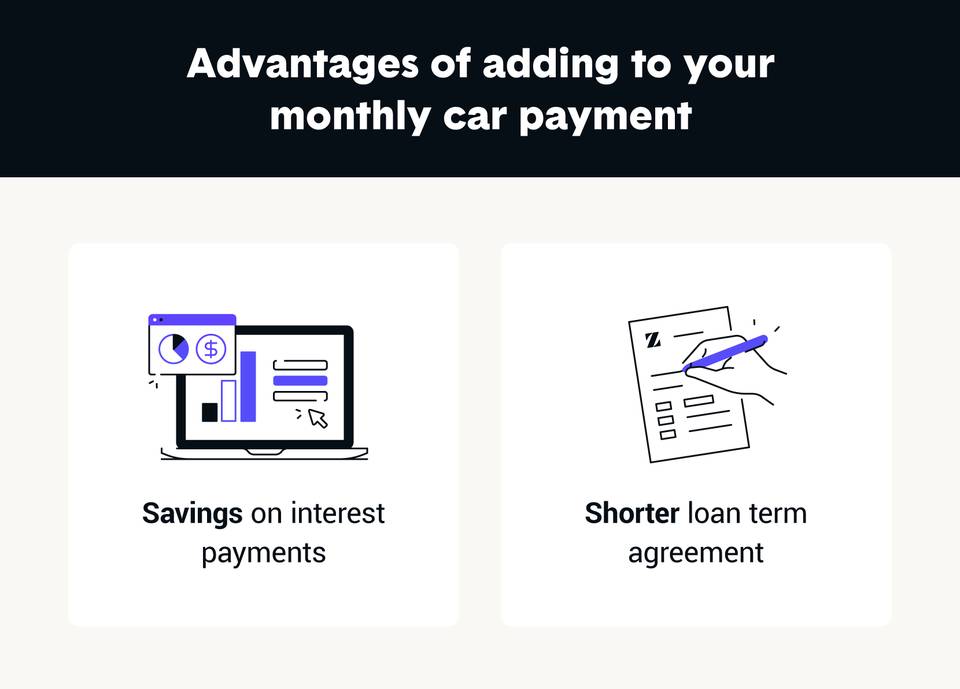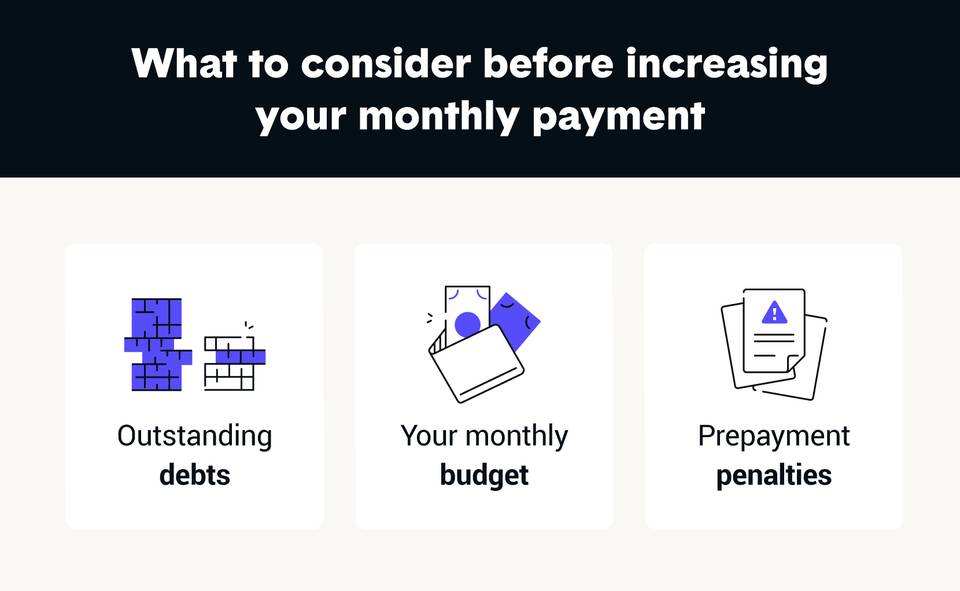Auto loan payoff calculator
Learn what you can save by adding to your monthly car payment.

Save an average of $440 on car insurance when you let us shop for you!
Auto loan payoff calculator
Auto loan terms can be lengthy, and sometimes car buyers find themselves with the ability to add to their monthly principal payment midway through their loan. In principle, this makes a lot of sense. Adding to your monthly payment can shorten your loan term and expedite your path to owning your vehicle.
If this is an option for you, it’s important to know how many months you will shorten your term by if you increase your monthly payment by a specific amount, as this will directly affect the amount you choose to add.
However, this process requires some complicated calculations and knowledge of how a loan amortizes over the course of a term.
Luckily, we’ve done that part for you.
How to use the auto loan payoff calculator
Our auto loan payoff calculator can show how many months you could shorten your loan term by and how much you could save on interest.
To use the calculator, simply input your loan amount, the interest rate on your loan, the length of your loan term, the remaining months left on your loan and how much you’d like to add to your monthly payment.
Accounting for your additional payment and the amortization of the loan, the calculator will then generate the number of months you’ll shave off your loan term and your interest savings. It will also give you a snapshot of how your loan payments will amortize over the course of the term, considering your desired additional payment.
If increasing your monthly payment is an option for you — terrific! But, there are other factors you should consider before upping your payment. Keep reading as we discuss the car insurance implications of increasing your monthly payment and some other elements to consider before you decide to increase your payment.
Advantages of increasing your monthly payments
You’ve determined how many months you can shave off your loan by increasing your payment, but is it worth it? Here are the two key advantages of increasing your payment.

Savings on interest payments
Interest makes up a significant portion of what you’ll pay over the course of your car loan. Therefore, as long as your interest isn’t precomputed, you’ll save on overall interest payments by upping your monthly payment and shortening your loan term.
Since auto loans amortize over the course of the loan term, the interest you owe is front-loaded and can make up a large portion of your payment, especially toward the beginning of your loan term. Paying off your car loan early allows you to get back what you would’ve paid in interest.
The amortization schedule included in the calculations above offers a glimpse into the monthly interest payments you’d get back if you cut your loan term short.
For example, if you have a loan for $30,000 with an 8% interest rate over 48 months, your monthly payment would be $733. Over the life of the loan, you would be paying $5,145 in interest on top of the $30,000 principal loan amount. However, let’s say after the first 12 payments you are able to contribute an extra $250 per month. This would mean your monthly payment would increase to $983 per month, but you would save $880 in interest over the life of the loan.
Shorter loan term
There are other benefits to shortening your loan term that occur once your car is paid off. If you end your loan term sooner than planned, you’ll have more take-home pay that doesn’t go toward car payments. This gives you more to spend on higher-interest payments like credit card bills and personal loan debts.
Using the same example scenario above, contributing an extra $250 per month towards the remainder of your $30,000 loan after the first year of payment would mean you reduce the loan term by 10 months. That means instead of having 36 payments left, you would only have 26.
In the next section, we’ll discuss the insurance implications of shortening your loan term.
Does paying off a car early affect insurance rates?
Paying off your car early doesn’t directly affect insurance rates, but it gives you more control over your coverage options and allows for a more affordable car insurance plan. Once your loan term ends, you have the option to:
- Raise your deductible, which can lower insurance rates and give you more control over what you pay.
- Cancel coverages that are no longer necessary.
When it comes to canceling coverage, gap insurance is typically the most pertinent. Gap insurance refers to insurance that covers “the gap” between what the car is currently worth and the amount you still owe. Since you fully own your vehicle at the end of the loan term, you can cancel this coverage.
What to consider before increasing your current payment
Reducing the interest and life of your loan may sound great, but there are other factors to keep in mind before you do so. A few of these include:

Your budget
In theory, paying off your car loan early seems like a great idea; however, it’s only practical if your budget allows for it. Stretching your budget to shorten your loan term can end up being counterproductive, especially if it causes you to become late on other recurring payments.
Consult a personal finance tool before you increase your payment to ensure your budget allows for it.
Outstanding debts
When looking at your finances as a whole, prioritize paying off debts with the highest interest rates first. Personal loans and credit card debts tend to yield higher interest than car loans. Therefore, if you have outstanding debts in high-interest categories and have disposable income, it’s best to take care of those other debts before adding to your monthly auto loan payments.
Prepayment penalties
If you try to pay a loan off early, a lender will sometimes charge you a prepayment penalty. This penalty fee incentivizes the borrower to pay their loan slowly so that the lender may collect the full amount of interest. If applicable, the fee should be included in the loan agreement so you’re aware of the possibility at the start of your loan term.
Additionally, not all lenders allow you to change your monthly payment during the course of your loan term. As a result, it’s best to have a conversation with your lender about the practicality of increasing your payments before you do so.
Frequently asked questions
For more details about the intricacies of car loan payments, here are some common questions and answers about the topic.
Can you calculate your monthly car payment?
Yes. You can calculate a monthly car payment by hand with a relatively straightforward formula. You can also easily access this information through our car affordability calculator.
Is a shorter or longer car loan better?
There are benefits to both long- and short-term loans. While shorter loans will yield less interest over time, you’ll find yourself paying pricier monthly payments before you pay the car off.
On the other hand, a longer-term loan, while being cheaper on a monthly basis, will build up more interest over time. A longer loan may mean a more affordable vehicle, but the way loans amortize means your interest payments could be substantially larger from the beginning to the end of your loan term.
Finding something in the middle, like a 36-month loan, is often the best route.
Is it better to pay off a car loan early?
Paying off a car loan early is best only when it’s practical. For example, if there isn’t room in your budget to increase your monthly payment or you have more outstanding debts you need to pay, it doesn’t make sense to increase your payment.
Additionally, if there is a prepayment penalty for changing your monthly payment, then it likely won’t be worth increasing your payment. However, if you’re financially able to do so and your lender allows it, increasing your monthly payment can help you save on total interest payments.
Once you fully own your vehicle, remember to reevaluate your insurance plan and compare different car insurance quotes to be sure you’re getting the plan that’s right for you.
Stay in touch and subscribe!
Get advice, insights and tips from our newsletter.
Related Content
- How much car can I afford? [free calculator]
- Seat belt sabotage: Roughly 1/3 of Americans don’t buckle up in rideshares
- Handicap parking permits: Who can use them and how
- No car, no problem: Green transportation options for short commutes
- 10 worst cities for driving conditions
- America's best and worst drivers by city
- What is a smart city? [Infographic]
- Everything You Need to Know About Car Sharing
- 7 Experimental technologies that will change the way we drive at night
- 13 considerations for living in your car